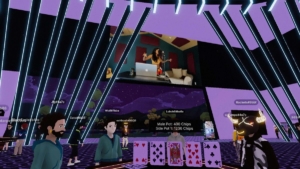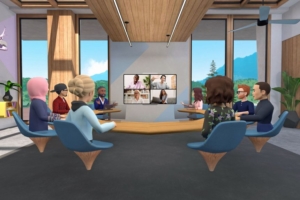The Metaverse Real Estate Boom Is Out Of This World
Once upon a time, people lived happily in the real world and bought houses made from bricks and mortar. Now, they can buy real estate in the virtual world—the metaverse, to be precise. Bricks and grout are being replaced by pesky ones and zeroes. This seems silly to a pragmatist; after all, you can’t live in a digital house. You certainly couldn’t use the bathroom, or the kitchen either, for that matter. So, what does it mean when we read stories that report how folks are splurging their precious savings on a virtual property? Such an article appeared recently on ABC.net.au. What is the motivation for meta-homebuyers? Is it a love of video games, or are there practical reasons behind it? Will it eventually become a big money-spinner? There are already real estate agents selling plots of space in online communities. What does it all mean?
What Is the Metaverse?

The term “meta” comes from the Ancient Greeks and means “beyond.” The verse is derived from the word “universe.” This is a term that evolved from Latin to Middle English and means “one whole.” Currently, it is a suffix employed to denote anything representing an area of self-interest, such as the media-verse. So, we take it to mean the verse beyond. However, while that explains the word, the metaverse itself requires more of an explanation. In essence, it is the continuance of technological convergence, incorporating what were hitherto one or more technological devices. For instance, today’s mobile phones blend a camera, telephone, television, typewriter, radio, tape recorder, and video recorder. With the inclusion of apps, your phone can be much more. Yet, thus far, the online world has required a screen serving as an interface. Meanwhile, the metaverse takes the user inside the gaming worlds previously depicted on the screen.
The idea of the metaverse has been around for a while. It was initially the stuff of science fiction, like Neal Stephenson’s 1992 novel Snow Crash and William Gibson’s writing. Thereafter, it inspired companies to emulate the concept, which they began with projects like the 2003 online multimedia platform Second Life. SL is still around in 2022, although due to recent legislation it has removed a popular monetising function. In Second Life, players create an avatar and live an alternative life in an online virtual world. It bears a kinship with multiplayer online role-playing games like Fortnite. The metaverse is similar to this, only much more expansive. Once the player creates an avatar, they don special goggles and can jump through different online worlds. The real world is melded with the virtual world in that players can shop for real items as they would on eBay.
Is The Metaverse Different To The Internet?

The Internet is created by billions of computers connected to a network by millions of servers. Users log online to communicate with each other on social media platforms such as Reddit and Facebook. They buy and sell goods and services online. Once, we read newspapers and watched the news on TV. Media companies have since migrated to the Internet. Techno utopians enthusiastically welcomed the advent of the Internet in the 1990s as a brave new frontier. Some futurists foresaw an emancipating digital universe that would welcome free thought and expression. Others feared it would become a sinister vortex of surveillance and control. Both were right. The metaverse is not separate from the Internet but exists within it. It builds on it. While users “browse” the Internet, the metaverse encourages them to “live” within its immersive spaces. Unlike the Internet, the metaverse has started life as a commercial space.
The easiest way to imagine the metaverse is to consider the removal of the traditional screen interface. The user now wears Virtual Reality (VR) goggles. These tricky headsets permit the user to look, see, touch, and move around inside the virtual ecosystem. Consider it the next evolution in online interaction. The user, with the creation of a personalised avatar, travels within the virtual worlds. Users are free to carry on as usual without the VR glasses. Instead of shopping from a one-dimensional screen and clicking items, shopping online will become virtually a hands-on experience. That is, using virtual hands and browsing virtual goods and services. Not only are gaming companies lining up to host their games on the metaverse, but governments are moving in. For example, Barbados is establishing a diplomatic embassy in the metaverse. Like the Internet, will it become an experience gated by big companies?
Virtual Real Estate, What Is It?

Virtual real estate agencies are springing up. They are young, start-up companies getting in ahead of the boom in virtual real estate. Sites such as Tiliaverse are offering a virtual reality map based on the real world. You can go anywhere you like (perhaps your family house) and buy it. This is known as purchasing Non-Fungible Tokens (NFTs). What are they? Well, that’s a long story, but essentially, they are part of the whole blockchain crypto-currency universe. Non-fungible means a unique digital identifier. They are recorded on the blockchain, which certifies authenticity and authorship. Then you can buy or sell them. Why would you want virtual real estate? The same reason people buy actual real estate—to develop and sell. If you build a shop in the metaverse, you must own the space. You might build a virtual café so that you can hang out with your friends.
Ultimately, you can consider the purchase of NFTs, or virtual real estate, as an asset. It isn’t the type you can store in a safe or carry around with you, but it’s there. The possibilities for the metaverse are endless—from gaming to buying and selling, to whatever can be imagined and realised. Investment banks like Morgan Stanley believe the market size of the metaverse will be worth trillions of dollars. Others are more sceptical and urge caution. That isn’t stopping ordinary Australians from dipping into their monetary reserves and splashing out on virtual real estate. They knocked cryptocurrency when it first emerged, so maybe there is something in it. However, whether or not encouraging people to live outside of reality is healthy is yet to be investigated. As it is, Internet shopping has led to the closure of physical retail stores and, with it, a sense of real community.
Facebook And The Metaverse

In October 2021, Facebook as a company changed its name to Meta. It is a pioneering venture between Mark Zuckerberg and Microsoft. The plan is to move away from the static social media platform and into an interactive virtual world. In such a move, current Facebook users would not just post on timelines but could chat in real-time using avatars. It is all still a bit up in the air because they haven’t yet figured out exactly what the end product will be. But that hasn’t stopped them from making exciting announcements about the project. Yet, with the negative aspects of Facebook’s track record, such as exploiting users’ data, it is best to adopt a conservative approach. The metaverse is a corporate enterprise, which means that it is all about profit. Social media employs methods that addict users by manipulating dopamine. The metaverse would also become an addiction medium.
Conclusion
Speculative types will definitely have an interest in investing in virtual real estate in the metaverse. Prudent investors will be more interested in acquiring actual land and property. True enough, there are risks in both. An act of nature can topple a house or building, while cyber warfare could destroy blockchain assets. But real estate (not the virtual kind) has substance in the living community. However, technology can not be slowed. Things change so fast that it is hard to keep up. We must, however, keep up. Therefore, it makes sense to stay abreast of whatever technology has to offer us. For somebody living comfortably in a home that is itself an asset, gathering land in the metaverse is simply an expansion of their portfolio. However, we at Perfect Agent deal in the housing market. If you need help finding an agent to connect you with your dream property, contact us.





